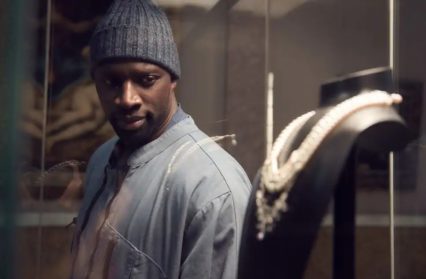Thomas Tyrrell reviews Lupin: In the Shadow of Arsene, and considers the age-old rivalry between the consulting detective and the gentleman thief.
Was it really less than five years ago that the execrable Versailles (2016–2018) was filmed in English to give it readier access to international markets? Since then, responsive, dramatically engaged dubbing has become such a successful art that the much lower-budget Lupin has become the first French TV series to hit the top ten on Netflix UK, with similar success all around the world. British viewers particularly will find much in it that’s familiar from their own home-grown programming.
Lupin: In the Shadow of Arsene, to give it its full French title, introduces us to Assane Diop, a Senegalese immigrant whose father works as a chauffeur to the wealthy Pellegrini family. After his father is framed for the theft of a diamond necklace and found hanged in his prison cell, Assane must grow up alone. As an adult, inspired by Maurice LeBlanc’s pulp stories of Arsene Lupin, Gentleman Thief, he plans to clear his father’s name and expose the corruption at the heart of the Pellegrini family – by fair means or foul.
Arsene Lupin was conceived as the French answer to Arthur Conan-Doyle’s incredibly popular Holmes and Watson stories, to the extent that Sherlock Holmes and – later, after Conan-Doyle objected – Herlock Sholmes appears in many of the stories, the consulting detective acting as rival and foil to the gentleman thief. It’s fitting then that Lupin takes a lot of cues from BBC’s phenomenally popular Sherlock (2010–2017), including the slick visual style, smart propulsive plotting, and a jaunty theme tune that’s pushing borrowing to the edge of theft.
What saves the show from simply being Sherlock en Francais is the savvy move of casting Omar Sy as its stand-in for Arsene Lupin. Six foot three and built accordingly, he’s few people’s idea of an unobtrusive master of disguise, but the playful script sells it by giving him a full gamut of black identity to run, from African tech billionaire to Deliveroo rider, hapless drug runner to hipster IT guy, and his transformations are a joy to watch. It adds a new dimension to the story of the underdog thief outwitting the overmighty rich, and the ease with which Sy slips into the role makes it incredible that there’s never been a black Sherlock Holmes. Without ever getting on its soapbox, the series makes a strong statement for the opportunities that more diverse casting opens up.
However, half the fun of the chase is in the pursuit, and that’s the one area where Lupin falls down. The detectives on his tail should really have brought him in for questioning around episode two, shortly after one of them realised he’d made the classic villain boast of making his alias, Paul Sernine, an anagram of Arsene Lupin. All sorts of artificial limitations are placed on these hapless detectives to prevent them from making the obvious connections, and it might have been more satisfying to give Assane a new detective to outwit every episode, only combining their powers for the finale.
Happily, the credibility isn’t stretched over-thin across the five episodes of this eminently bingeable series, taking us from the glitz of a heist in the Louvre in episode one to a tense cliffhanger at an Arsene Lupin festival on the Normandy coast. A second series is already confirmed, and if it can exploit the opportunities of its premise whilst avoiding the overweening hubris that made the final season of Sherlock such a god awful mess, it may yet prove to be the definitive statement on how to give a nineteenth-century cult figure a twenty-first century reboot.
Lupin: In the Shadow of Arsene is available to stream now on Netflix.
Thomas Tyrrell has a PhD in English Literature from Cardiff University and is a regular contributor to Wales Arts Review.
(Header image: Omar Sy in Lupin: In the Shadow of Arsene. Credit: Emmanuel Guimier.)












